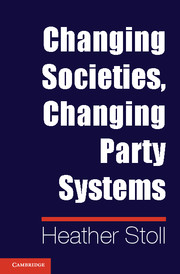Book contents
- Frontmatter
- Contents
- List of Tables
- List of Figures
- Acknowledgments
- 1 Introduction
- 2 Social Heterogeneity and the Number of Parties: A Theory
- 3 Describing Social Heterogeneity: Measures and Testable Hypotheses
- 4 Social Heterogeneity and Party System Fragmentation: Empirical Evidence across Space and Time
- 5 Israel: New Parties for New Groups?
- 6 Israel: Testing Hypotheses about Sectarian Party Success
- 7 The United States: New Parties for New Groups? Testing Hypotheses
- 8 Conclusion: Party System Fragmentation and Beyond
- A Additional Material for the Quantitative Analyses in Chapter 4
- B Demography in Israel
- C Sephardi and Russian Sectarian Parties and Their Success in Israel
- D Demography and the Franchise in the United States
- E African American Descriptive Representation in the United States
- Bibliography
- Index
4 - Social Heterogeneity and Party System Fragmentation: Empirical Evidence across Space and Time
Published online by Cambridge University Press: 05 June 2014
- Frontmatter
- Contents
- List of Tables
- List of Figures
- Acknowledgments
- 1 Introduction
- 2 Social Heterogeneity and the Number of Parties: A Theory
- 3 Describing Social Heterogeneity: Measures and Testable Hypotheses
- 4 Social Heterogeneity and Party System Fragmentation: Empirical Evidence across Space and Time
- 5 Israel: New Parties for New Groups?
- 6 Israel: Testing Hypotheses about Sectarian Party Success
- 7 The United States: New Parties for New Groups? Testing Hypotheses
- 8 Conclusion: Party System Fragmentation and Beyond
- A Additional Material for the Quantitative Analyses in Chapter 4
- B Demography in Israel
- C Sephardi and Russian Sectarian Parties and Their Success in Israel
- D Demography and the Franchise in the United States
- E African American Descriptive Representation in the United States
- Bibliography
- Index
Summary
Having developed new measures of social heterogeneity, it is time to begin testing my theory about how a democracy's social heterogeneity shapes the fragmentation of its party system. One of the core arguments I advanced in Chapter 2 was that a group of individuals newly added to a democracy's citizenry is likely to successfully form its own sectarian political party, increasing the fragmentation of the party system, when the characteristics of the group and systemic features of the polity take certain favorable forms. That is, I argued that several factors besides the electoral system indirectly condition the effect of social heterogeneity on party system fragmentation. I also argued that the polity's prior social heterogeneity directly conditions this relationship. The question now is whether the empirical evidence supports these arguments.
In this chapter, I provide some answers to this question by conducting a quantitative empirical analysis that assesses the evidence across both space and time. My dependent variable in this analysis is party system fragmentation. I use linear regression to analyze the relationship between this dependent variable, the independent variable of social heterogeneity, and some of the hypothesized conditioning variables. I say “some” because not all of my hypotheses could be tested in this manner due to the difficulty of developing cross-national measures of the variables. Later chapters will turn the empirical lens on the key mechanism of interest, sectarian party success, and subject the remaining hypotheses to empirical scrutiny using case studies of Israel and the United States. The case studies will also provide additional tests of the hypotheses tested here, a triangulation designed to increase the study’s internal validity.
- Type
- Chapter
- Information
- Changing Societies, Changing Party Systems , pp. 90 - 123Publisher: Cambridge University PressPrint publication year: 2013



